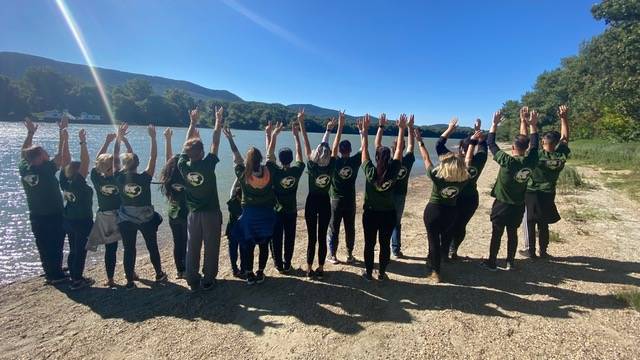Kingnewswire // press release // At a time when ecological problems get worse, it has never been so urgent to adopt an approach to environmental action based on values. Aware of this, the United Nations Environment Program launched the “Faith for Earth” initiative (Faith for Earth), a global effort aimed at involving religious and spiritual communities as essential partners in the protection of the planet. At the heart of this initiative is a simple but deep idea: that moral benchmarks and inner transformation are just as essential to sustainability as science and technology. We see this vision coming to life more and more concrete in Hungary, where a movement inspired by The path of happinessa common sense moral code written by L. Ron Hubbard, mobilizes scientologists and local citizens so that they take significant and practical measures in favor of the restoration of the environment, a cleaning action, a conversation, a responsible act at the same time.
A clean planet begins with a clear conscience
On the occasion of World Environment Day 2025, the Budapest Scientology Church organized a round table entitled “The present and the future of environmental protection from the point of view of science and religion”. Scientists and spiritual leaders from various traditions (Adventists, Catholics, Hindu and Scientologists) met for a rare and significant dialogue.
The discussions have revealed a common understanding: true environmental sustainability requires more than political reforms or green technologies. It requires a transformation of the way people think, live and assume their responsibilities. A scientologist worker stressed that real change begins when individuals decide to live ethically, not for fear, but for the sake of the common good.
A concept from the principle “protect and improve your environment” from the book The path of happiness resonated throughout the event:
“The idea that everyone has a share in the planet and that he can and must help take care of it may seem very large and, for some, completely unrealistic. But today, what is happening on the other side of the world, even very far, can have repercussions on what is happening at home.»L. Ron Hubbard
In a world that often favors comfort to the detriment of consciousness, this message has affected a sensitive string, reminding participants that taking care of the environment is ultimately a personal choice, repeated day after day.
The movement for a better world: a moral code in action
This principle is put into practice visibly in the work of the Jobb Világ Mozgalom (Movement for a better world), founded by Attila Kis-Balázsa Hungarian scientologist whose commitment to the environment is deeply rooted in The path of happiness.
What started as an individual initiative, to collect waste when he was a child, has turned into a dynamic national movement of volunteering. Today, hundreds of people participate in cleaning operations organized throughout Hungary. And if the work is concrete, the spirit which animates it is undeniably ethical.
“The path of happiness brought me clarity. He showed me that doing good is not only idealistic, it is essential. When people feel that they can change things, they do it. »-Attila Kis-Balázs
Each cleaning operation is guided by principles such as:
- “Give a good example. »»
- “Protect and improve your environment. »»
These ideas are not theoretical: they are put into practice during joyful, inclusive and deeply enriching monthly events.
How it works: an action inspired for a cleaner Hungary
In Hungary, The way to happiness has become much more than a book: it is the ethical pillar of an expanding environmental movement. At the heart of this movement is Attila Kis-Balázs, a longtime scientologist whose personal history is as fascinating as the cause he defends.
Long before founding the Jobb Világ Mozgalom (Movement for a better world), Attila was just a boy who was walking in the streets of his city, discreetly picking up waste. “It didn’t seem to me to be an extraordinary gesture,” he recalls. But it just seemed to me. This little gesture, repeated over the years, would later turn into something much bigger: a coordinated national effort to clean and maintain Hungarian public spaces, with kindness, joy and determination.
The turning point took place when Attila read The path of happiness. His simple but powerful principles, in particular “help take care of the planet” and “avoid doing things that others will have to clean,” brought him the moral clarity he was looking for. “It put the points on the I for me,” he says. “It was not only a question of collecting the waste. It was a question of being the kind of person who leaves the world better than she found it. »»
Motivated by this ethical framework, he began to organize cleaning events, first with friends and family. But word of mouth quickly worked and the rallies gained momentum. Today, the Better World Movement mobilizes hundreds of volunteers across Hungary, creating a snowball effect that results not only by clean parks and streets, but also in a boost of energy within the communities concerned.
The moral code that guides the movement
The impact of the Better World Movement is particularly noticeable during cleaning operations organized on weekends. No fanfare, just people of all ages who come with gloves, bags and a common motivation. The atmosphere is relaxed, often accompanied by music, laughter and improvised conversations between strangers. The work is concrete: collect waste, sort recyclable materials, restore green spaces. But what strikes the new participants is the feeling of unity.
Events generally last two to three hours and are followed by an informal meal or discussions. The idea is not only to clean, but also to create links. “Some people come for the first time by simple curiosity,” explains a long -standing volunteer. “But they leave with the feeling of having done something important. It is this feeling that encourages them to come back. »»
Municipalities have also become aware of this movement. Local authorities often associate with movement and suggest places that need attention. A specially developed application makes it possible to coordinate efforts and encourage citizens to offer new sites. But what really feeds continuity is the emotional reward: the quiet pride of having improved something.
Although the movement is not limited to Scientologists, many of its most diligent volunteers are inspired by the book The path of happiness. They do not speak of this book as a set of rules, but as a guide to live with integrity. For them, picking up waste is not only an act of service, it is a way of expressing their respect for life and for others.
A global example of action motivated by faith
The Hungarian initiative is part of a broader awakening of religious communities around the world. The initiative Faith for Earth UNEP Specifies precisely this type of actions based on values: efforts that translate spiritual convictions into concrete actions to save the planet.
Iván Arjonarepresentative of the Church of Scientology to the European Union and the United Nations, considers the movement for a world better as a model illustrating how individual ethics can have repercussions on social change:
“What makes the way to happiness so effective is that it is addressed to the person, not in abstract terms, but by giving them concrete advice. When people align their actions on their values, change becomes inevitable. »»
From streets of Budapest to international dialogue rooms, the message is gaining ground: lasting change begins with people, and people guided by a moral code can actually change the world.
At a time when global challenges may seem insurmountable, the movement for a better world and The path of happiness offer something rare: a feeling of control, a sense and concrete and practical means to make the world better, an action at the same time.
Originally published at Almouwatin.com








